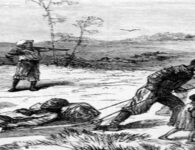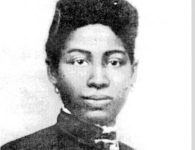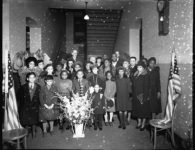Photo credits: Everett Historic Collection
An angry white mob in Rome, Tennessee, massacred a Black woman named Ballie Crutchfield on March 15, 1901.
Ms. Crutchfield was never charged with a crime. She was singled out only because the frenzied mob of white racists had failed in their attempt to kill her brother earlier that night. Disaster struck when a Caucasian man in Rome had apparently misplaced a wallet containing $120 a week before.
The wallet had been recovered by a young Black boy, who had passed it along to a young Black man named William Crutchfield. William was later accused by white people in Rome of snatching the wallet.
The strong racial hatred that pervaded Southern culture at the time imposed an implicit assumption of guilt on Black individuals. This unfavorable reality often worked to instill distrust in members of the Black community, who were accused of acts they may or may not have done. There was no proof to back up the assertion that Mr. Crutchfield had stolen the wallet. However, the exculpatory evidence did little to quell white anger over what happened.
An enraged white mob stormed Rome’s municipal jail that night and kidnapped Mr. Crutchfield from police custody. At some point, he miraculously managed to escape the grip of the seething white nationalists’ bloodlust and brutality as they prepared to lynch him. They were unable to locate Mr. Crutchfield after he fled their captivity.
Regardless, they were hell-bent on exacting their retribution on someone. They ultimately opted on Ballie Crutchfield, Mr. Crutchfield’s sister, and abducted her from her house. The crowd brought Ms. Crutchfield to a bridge in town, despite the fact that she was not even suspected of being involved in the stolen pocketbook. Her wrists were tied behind her back, she was shot in the head at close range, and her corpse was thrown into a brook.
Lynching was a kind of racial terror employed to preserve the white dominant culture’s absolute power in America. Lynch mobs terrorized the Black community as a whole. This heinous brutality was often unpredictably, pre-emptively, and arbitrarily carried out. It was highly usual during this century for a lynch mob’s emphasis to extend beyond a single individual accused of an infraction.
This is exactly what happened in the case of Ms. Crutchfield.
White lynch mobs typically attacked members of a suspect’s relatives, neighbors, or anybody else who happened to be in the way of the crowd. Countless Black individuals have been the victims of racial horror throughout U.S. history. It has not always happened because they were accused of crimes.
They were singled out because they were Black and were there when a lynch mob was unable to find its chosen victim. The corpse of Ms. Crutchfield was discovered in the stream the morning after she was murdered.
The coroner’s department immediately decided that she died “at the hands of unknown people.” No one was found responsible for her death. Ms. Crutchfield is one of at least 237 black persons in Tennessee who were lynched between 1877 and 1950.
According to the Equal Justice Initiative, more than 6,500 victims of racial terror lynching were recorded between 1865 and 1950.





















No comments